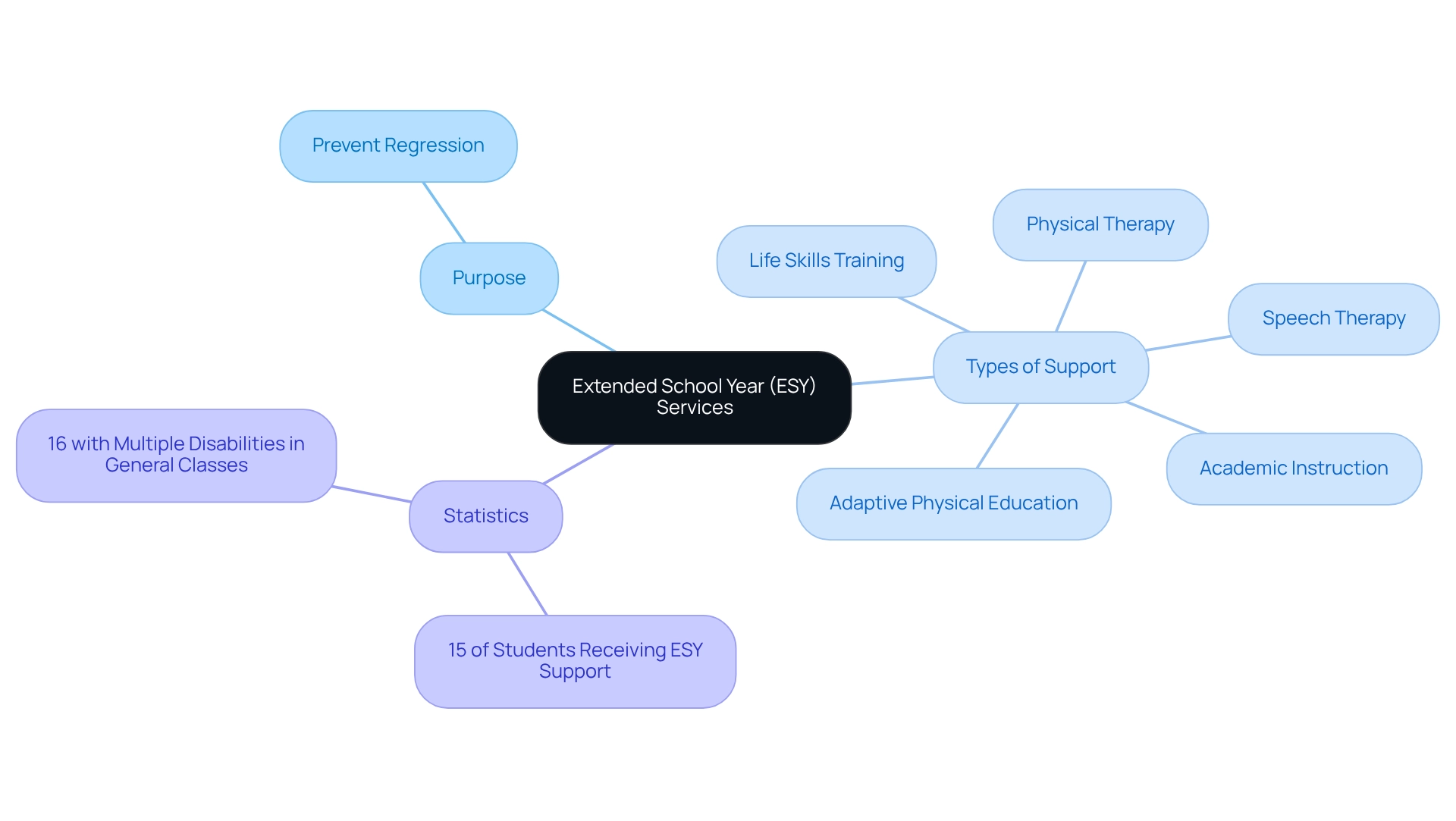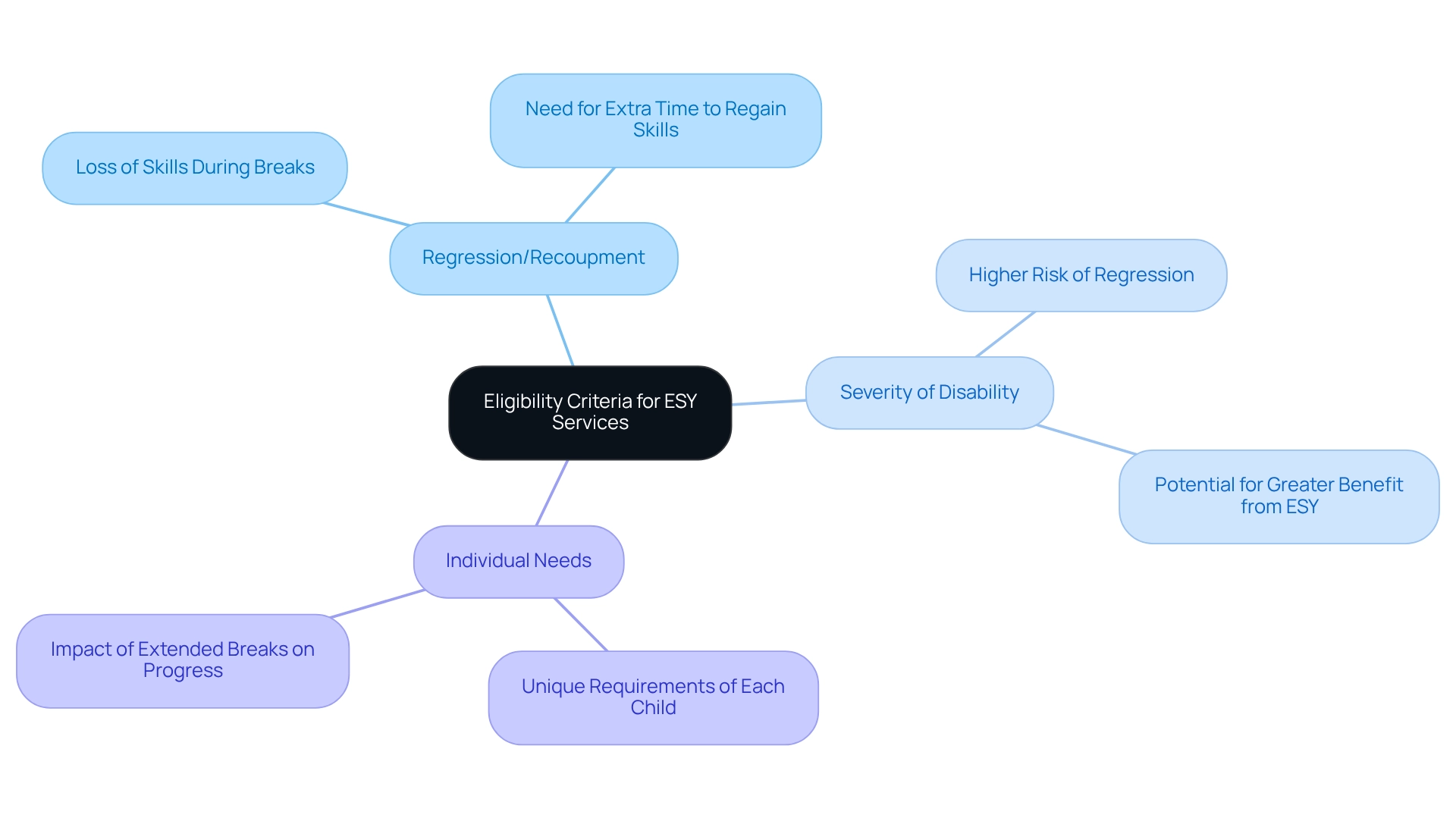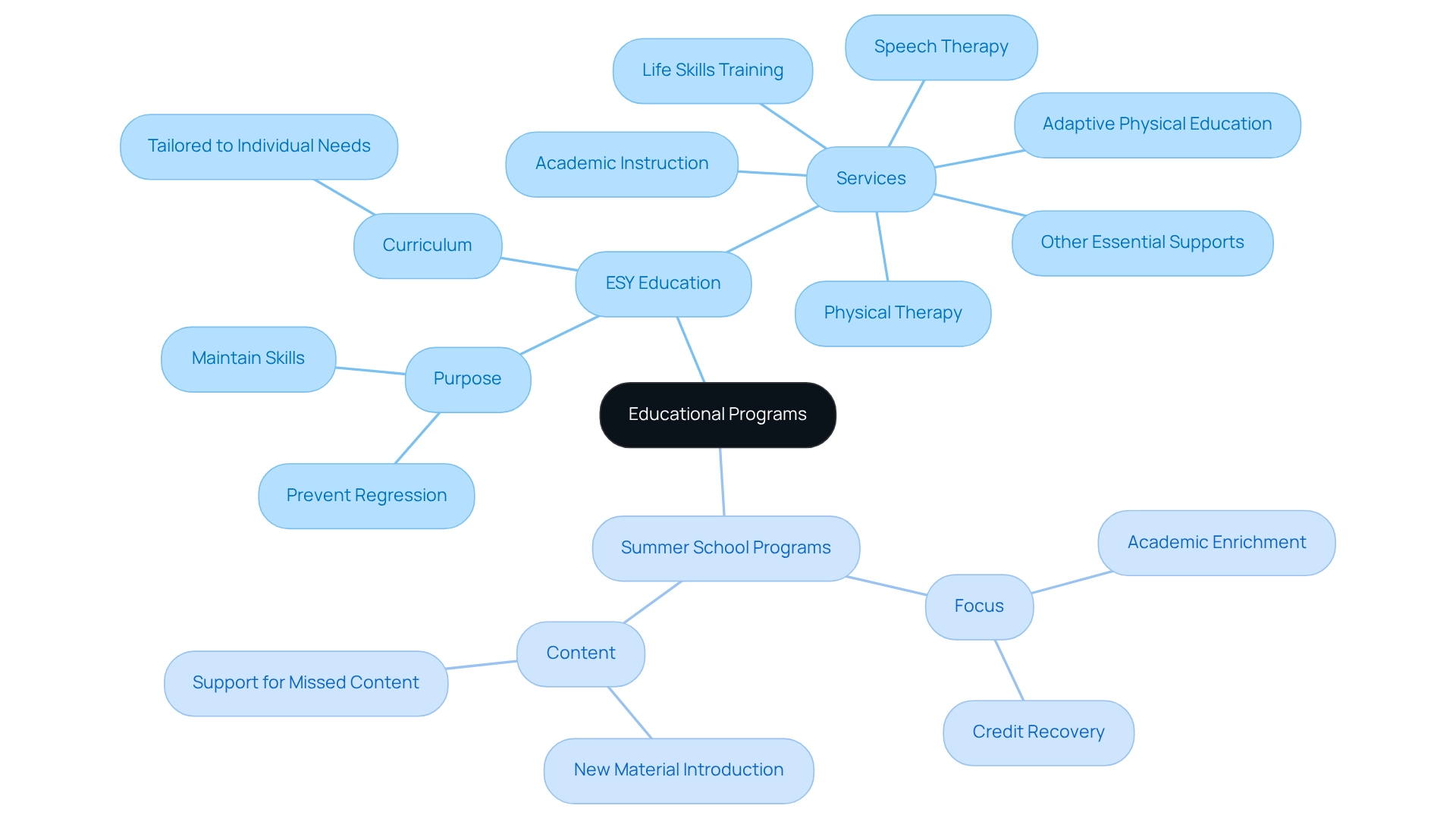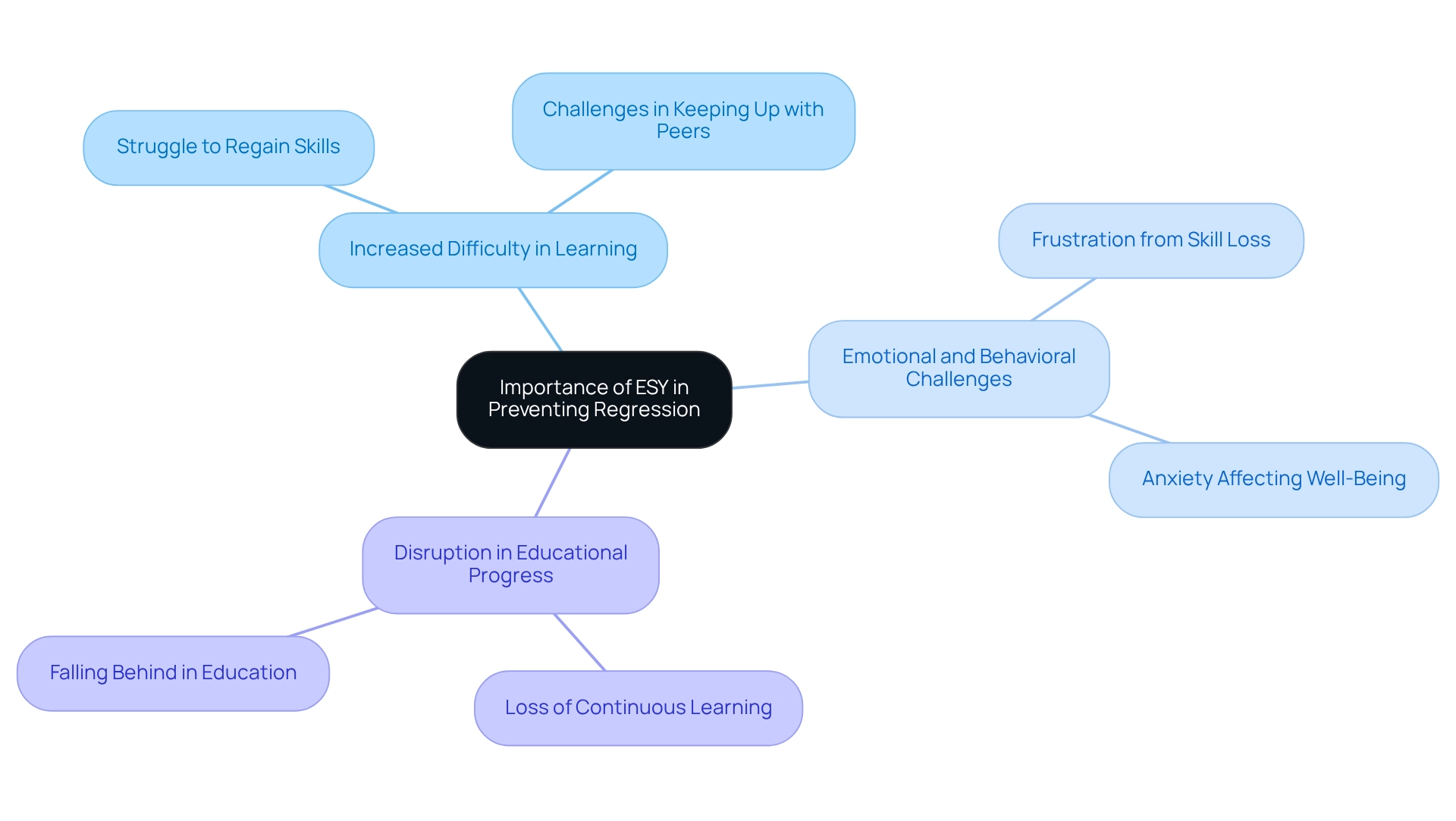Overview
Understanding Extended School Year (ESY) education is essential for parents navigating the complexities of their child's educational needs. This program is not just an extension of the school year; it plays a crucial role in supporting students with disabilities. By focusing on the eligibility criteria and the unique benefits of ESY, we can appreciate how it differs from traditional summer school programs.
ESY services are vital in preventing regression during school breaks. Imagine a child who has worked hard all year to develop their skills, only to lose ground during the summer months. ESY provides tailored support, ensuring that these students maintain their skills and continue to thrive academically. This support is not just a recommendation; it is mandated by the Individuals with Disabilities Education Act (IDEA), highlighting its importance in the educational journey of students with disabilities.
As we consider the challenges faced by families, it’s important to recognize the emotional weight of these decisions. Parents often worry about their child's progress and how to best support their learning during the summer. By understanding ESY, we can alleviate some of these concerns and empower families to advocate for their children's needs. If you have questions or experiences to share, please consider reaching out or joining our community discussions. Together, we can navigate this journey with compassion and understanding.
Introduction
In the landscape of special education, Extended School Year (ESY) services stand out as a crucial resource for students with disabilities, providing essential support beyond the traditional academic calendar. These individualized programs are designed to prevent significant regression in learned skills, offering a lifeline during long breaks to help students maintain their educational progress.
As the demand for special education services continues to grow, it becomes increasingly important for educators, parents, and advocates to grasp the nuances of ESY. This article explores the following:
- Definition of ESY services
- Eligibility criteria
- Distinct differences between ESY services and traditional summer school programs
It emphasizes the vital role ESY plays in fostering ongoing growth and development for students with disabilities, encouraging readers to reflect on their experiences and seek out further support.
Define Extended School Year (ESY) Services
Extended School Year (ESY) education support provides essential special education and related assistance for individuals with disabilities, extending beyond the typical 180-day academic year. As highlighted by the Individuals with Disabilities Education Act (IDEA), the purpose of ESY education is to prevent significant regression in the skills and knowledge that learners have gained during the regular school year.
These offerings are tailored to meet the unique needs of each student, ensuring they continue to thrive academically during long breaks from school. Unlike traditional summer school programs that often introduce new content, ESY education focuses on maintaining and reinforcing existing skills. This approach is crucial, especially in light of recent trends showing that 15% of public school learners received support under IDEA during the 2022-23 academic year, highlighting the increasing demand for special education resources.
Additionally, 16% of individuals served under IDEA with multiple disabilities spent 80 percent or more of their time in general classes, underscoring the importance of ESY education programs in addressing their specific educational needs. As K-12 education systems work to recover from the pandemic, the ongoing support for individuals with disabilities remains vital.
Educators emphasize that ESY education assistance can include various forms of support, such as:
- Academic instruction
- Speech therapy
- Physical therapy
- Adaptive physical education
- Life skills training
All of these services are focused on promoting continuous growth and development for individuals with disabilities. By customizing offerings to meet specific learner requirements, ESY education truly enhances the individualized approach that is so important for fostering success.

Identify Eligibility Criteria for ESY Services
Understanding eligibility for ESY education support is crucial for parents navigating their child's educational journey. The determination of eligibility is made by the individual's Individualized Education Program (IEP) team, and several key criteria come into play:
- Regression/Recoupment: Consider the possibility that your child might lose skills or knowledge during breaks. If they require extra time to regain those skills, they may qualify for ESY.
- Severity of Disability: It’s important to note that students with more severe disabilities often face a higher risk of regression. This means they may be more likely to benefit from ESY services.
- Individual Needs: Each child is unique, and the IEP team must carefully consider their specific requirements. This includes evaluating their progress and understanding how extended breaks could impact their ESY education.
It’s essential to remember that not every individual with disabilities will qualify for ESY education. Eligibility is assessed on a case-by-case basis, ensuring that each child receives the attention and resources they truly need. If you have concerns or questions about your child's eligibility, don't hesitate to reach out for guidance and support.

Differentiate ESY from Summer School Programs
While both ESY education and summer school occur during the summer months, they serve distinct purposes that are vital for the educational journeys of our children. ESY education programs are designed to maintain skills and prevent regression for individuals with disabilities. The curriculum is tailored to meet the specific needs of each learner, ensuring a seamless continuation of their education. ESY education services may include:
- Academic instruction
- Speech therapy
- Physical therapy
- Adaptive physical education
- Life training
- Other essential supports
For example, if a child receives specially designed reading instruction for 5 hours each week during the school year, a typical ESY program would offer 1.5 to 2.5 hours weekly of similar assistance. This personalized approach is crucial for effectively meeting the needs of individuals with disabilities and ensuring they retain the skills they have developed throughout the school year.
On the other hand, Summer School Programs generally focus on academic enrichment or credit recovery. These programs introduce new material or support learners in catching up on missed content, but they do not specifically cater to the needs of individuals with disabilities.
Understanding these differences is essential for parents advocating for their child's educational requirements. For instance, Arlington Public Schools has partnered with the Arlington Parks and Recreation Department to enhance summer experiences for students by providing additional activities and support beyond traditional academic programs. This collaboration illustrates how customized approaches can significantly benefit learners with diverse needs, underscoring the importance of ESY education resources in preventing regression and fostering knowledge retention.
In summary, while ESY education resources focus on preserving and enhancing skills for individuals with disabilities, summer school programs primarily aim at academic improvement. Recognizing these distinctions is crucial for parents to effectively advocate for the right educational support for their children.

Explain the Importance of ESY in Preventing Regression
The significance of ESY services cannot be overstated, as they play a crucial role in preventing regression for individuals with disabilities. Imagine the challenges faced when students return to school after long breaks; without ESY, many may experience significant skill loss, leading to various difficulties.
- Increased Difficulty in Learning: Students often struggle to regain previously learned skills, which can make keeping up with their peers a daunting task.
- Emotional and Behavioral Challenges: The frustration and anxiety stemming from regression can deeply affect an individual's overall well-being and motivation.
- Disruption in Educational Progress: Continuous learning is vital for maintaining momentum in education; ESY education services ensure that individuals do not fall behind.
By providing targeted support during breaks, ESY services help students maintain their skills, allowing them to be ready to continue their educational journey when school resumes. Together, we can ensure that our children thrive, even during those critical breaks.

Conclusion
Extended School Year (ESY) services are not just a component of special education; they are a lifeline for students with disabilities, designed to help them retain their skills and knowledge during long breaks from school. Imagine the worry of watching your child lose the progress they’ve worked so hard to achieve throughout the academic year. ESY services focus on preventing that regression, ensuring that students continue to build on their existing skills rather than starting from scratch. Unlike traditional summer school programs, which often introduce new material, these personalized programs reinforce what students already know, providing a nurturing environment for growth.
Determining eligibility for ESY services involves a thoughtful discussion among the student’s IEP team, who consider factors like the likelihood of regression and the severity of the disability. This individualized approach highlights the importance of tailoring educational support to fit the unique needs of each student. In a world that continues to evolve, especially in the wake of the pandemic, the significance of ESY services becomes even more pronounced. They serve as a crucial support system for students navigating ongoing challenges.
The role of ESY services in fostering continuous growth and development for students cannot be overstated. These services not only help prevent skill loss but also nurture emotional well-being and educational progress. As awareness of ESY services grows, it is essential for educators, parents, and advocates to champion these programs. Together, we can ensure that students with disabilities receive the support they need to thrive in their educational journeys. Let’s take action and make a difference—because every child deserves the opportunity to succeed.
Frequently Asked Questions
What is Extended School Year (ESY) education support?
ESY education support provides essential special education and related assistance for individuals with disabilities, extending beyond the typical 180-day academic year to prevent significant regression in the skills and knowledge gained during the regular school year.
How does ESY education differ from traditional summer school programs?
Unlike traditional summer school programs that often introduce new content, ESY education focuses on maintaining and reinforcing existing skills to ensure students continue to thrive academically during long breaks from school.
What percentage of public school learners received support under IDEA during the 2022-23 academic year?
During the 2022-23 academic year, 15% of public school learners received support under the Individuals with Disabilities Education Act (IDEA).
What types of support can ESY education assistance include?
ESY education assistance can include various forms of support such as academic instruction, speech therapy, physical therapy, adaptive physical education, and life skills training.
Why is ESY education important for individuals with disabilities?
ESY education is important as it addresses the specific educational needs of individuals with disabilities, promotes continuous growth and development, and supports their success, especially as K-12 education systems recover from the pandemic.




